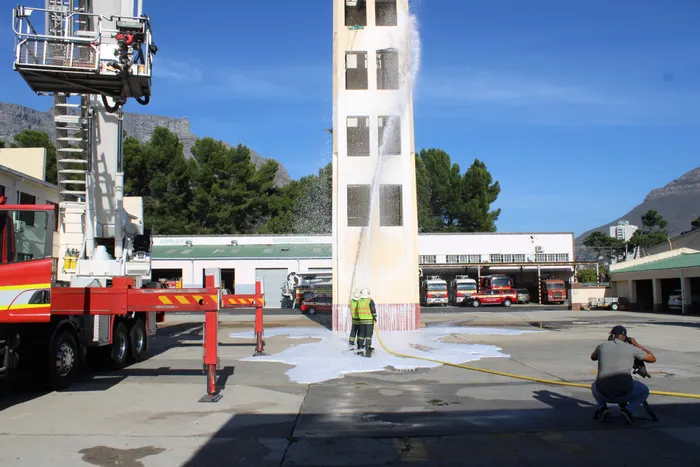Firefighters praised for their service

Firefighters test a hose while others scale the building.
To celebrate International Firefighters’ Day last week, fire stations around the city opened their doors to the public to give people the opportunity to learn more about the Fire and Rescue Service and what they do.
The day is marked annually on May 4.
The City’s Fire and Rescue Service has 64 fire engines, 29 water tankers, 26 skid units, 17 rescue vehicles, 13 aerial vehicles, 40 seasonal firefighters and 974 active firefighters employed across 32 fire stations.
“Our firefighters risk their lives to save others and we ensure equipment will not only assist in the performance of their duties, but also their protection. Our firefighters not only endure long hours in unbearable heat, but they provide an indispensable service crucial to the safety and security of all our residents,” said Ian Schnetler, the City of Cape Town’s Chief Fire Officer.

Between May 1 last year and April 28 this year, the Fire and Rescue Service responded to 22 632 incidents. While on duty the firefighters have been sabotaged by angry residents and criminals, with hoses and vehicles deliberately damaged, Mr Schnetler added.

“While the bulk of these calls are fire-related, 3 709 were motor vehicle accidents, 569 incidents of assault and many medical emergencies. I want to remind residents these men and women put their lives on the line selflessly and they are there to save the very lives of people who attack them and their equipment,” Mr Schnetler said.

JP Smith, the mayoral committee member for safety and security, said he experienced the demands that firefighters faced when he rode along with them responding to emergencies.
“We have counselling services for the firefighters, we have two full time professional counsellors and trauma practitioners for them. Some of them are referred for counselling, depending on the incident, and some ask voluntarily. There are counselling services that are discreet so that they have privacy,” Mr Smith said
“We are proud of the fact that firefighters keep it together under trying circumstance, the abusive conditions that they work in because the members of the public are stressed depending on the situation they are in, so these guys have to be instant psychologists to the injured sometimes,” he said.
